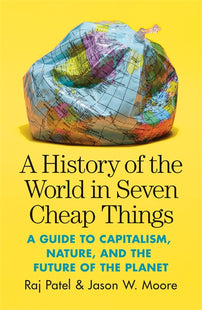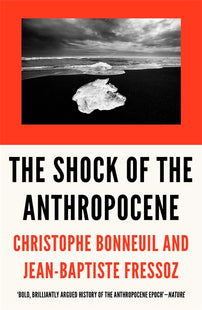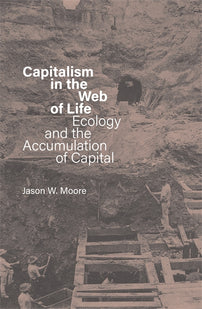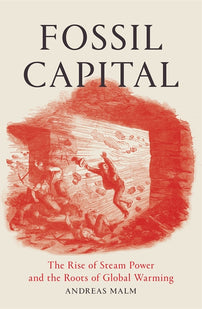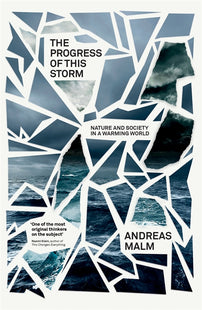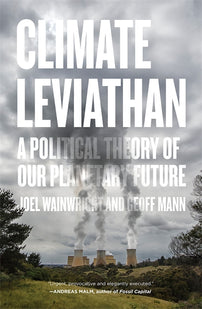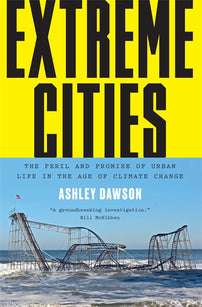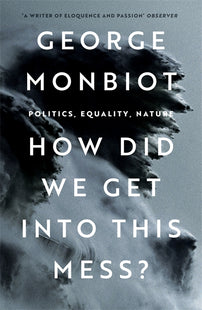This is a Crisis
The scale of the impending climate crisis is now apparent to more or less everyone. Yet, whilst it's been the left that has taken the lead in reponding to climate change for several generations, it is increasingly the far-right who are developing political responses to catastrophe. This has been reflected in the growing eco-fascist movement, a movement who were parachuted to global prominence on the 15th March this year when one of their number murdered fifty people in two Christchurch mosques. In this article, Eleanor Penny analyses eco-fascism and asks what it will take the left to deal with the scale of the climate crisis.

Recent studies have discovered microparticles of plastic in our lungs, our guts, our bloodstreams, rushing quietly around the average human body. The 300 million tonnes of plastic churned out each year makes its way, pulverised, into the air we breathe, we water we drink, the fish we eat.
It is easy to spin this into a simple morality tale; collective wastefulness cosmically returns to us as techno-plague for a new age of self-inflicted apocalypse. But the average human – drinking plastic, breathing plastic – did not ask for this. They didn’t design a system in which the whole web of life is endangered by the fantastically parasitic ambitions of a very small number of their species. And they didn’t profit vastly off an industry of single-use plastics and petrochemicals. And individually abandoning plastic straws does little to correct the fact that they are breathing plastic, drinking plastic, preparing for the next summer where wildfires, floods and hurricanes spring up across the territories they call home.
The UK government is the first in the world to declare a ‘Climate Emergency’. In the eyes of her majesty’s parliament, the conditions of stable human life on this planet are officially imperilled. This move was a key demand of Extinction Rebellion, which shut down central London for nearly a week with demands it declared “beyond politics”. The glow of victory has rapidly dwindled now this demand (apolitical, anti-political) is now entrusted to the sweaty hands of Westminster, to be horse traded for party favour. Labour have committed to decarbonising by 2050 – a step in the right direction, but not nearly the vast legislative leap needed to stave off catastrophe. The Conservative Party is in a state of patrician denial; gently reassuring protesters that environmental policy is safe with them, whilst firing up a brand spanking new generation of coal stations and fracking initiatives.
This is precisely the problem: it’s not clear what a ‘crisis’ means - and what it demands of a state, of an economic system. If apolitical environmentalists are to maintain their apolitical credentials, they can’t dirty themselves in those kinds of details. The crisis must transcend the political, because petty intra-human disputes supposedly pale in comparison to the biggest existential threat we’ve ever seen. There is only one, grand biological constituency: the species ‘us’.
Sasha Josette has pointed out that this romantic universality tramples the flat the extraordinary differences between different members of our embattled species. It obscures the the fact that the population of the global south, plundered to fund the industrial wealth of colonising countries, is being hit first and worst. That under 100 companies are responsible for 70% of global emissions, and their CEOs and shareholders are cleaning up. That super rich are readying their arks for the coming flood.
A staunch refusal to acknowledge the political rifts at the heart of the climate crisis also suspends the question of what a solution looks. There’s a naive romance to the idea that elite classes aren’t already intimately aware of the scale of the ecological threat, that they simply need to be shocked out of their complacency, and realising their fundamental allegiance to the rest of humanity they’ve glamorously abandoned in their long trek to wealth and power. If they truly recognise the crisis, they will resolve it – disassemble the fossil fuel industry and roll out a green utopia.
It’s not hard to see why the bare fact of environmental crisis is seen as a unique opportunity for the left. The climate crisis is a crisis of capitalism, a crisis of colonialism and of global dispossession. The modern environmental movement – Extinction Rebellion included – skews left, and the fossil fuel industry has reliably found its allies on the modern right; from Blairites, hawkish paleocons or the modern wannabe-tyrants crawling up through the fog of post-crash political upheaval. But those loyalties aren’t as tidily sorted as we might like. In the UK alone, older unions with their sights set on job preservation press for further investment in coal mining and aviation. Even in the explicitly left wing environmental movement, you can find ghoulish undercurrents of eugenic thinking which sees high birthrates in some African and Asian countries as the primary threat to species survival. And there’s a growing movement of self-titled eco-fascists – as Sarah Manavis puts, it “white supremacists who argue that racial purity is the only way to save the planet.” And it is these eco-fascists that were parachuted to global prominence on the 15th March this year when one of their number murdered fifty people in two Christchurch mosques.
You might expect that a declaration of crisis – finally swallowing a longstanding expert scientific consensus – would strike a blow against the demagoguery of right wing political culture which revels in its rejection of both science and experts. But recognising a crisis as such isn’t simple about being bludgeoned into submission with the brute force of fact. It’s about metabolising those facts into a real sense of urgency – a sense of fear. And the right – more specifically, the far right – has a long and ignoble history of laundering collective terror and frustration into a mandate for industrial levels of violence. We are facing down dwindling resources and an unprecedented number of people forced from their homes by climate chaos – facts easily conjured into a right wing imaginary of migrants ravening for the finite resources meant to sustain white life. It might be nice to think that left wing solutions will unfurl from left wing critique. But we have no such guarantees.
[book-strip index="1" style="buy"]In a brutally biologically understanding of climate change, the idea that climate change is a problem for the species easily slips into the idea that it’s a problem of the species. Many neo-Malthusians from across the political spectrum hand-wring about overpopulation as the first frontier to solving climate change. We’ve won a pyrrhic evolutionary victory, we've become so successful as a species that our destructive inclinations to over-breed, over-produce and over-consume will ultimately destroy our environment, and that of millions of other species besides. It is the solemn task of civilisation to collectively unshackle humanity from its biological destiny – to destroy any ecosystem unfortunate enough to host it. It’s a view popular in ‘deep ecology’, which that all life has value irrespective of its usefulness to human beings. So far, so unobjectionable. But it often comes buoyed with outrage at the arrogance of humanity to plunge us into a mass extinction to satisfy its own monumental cravings. It has the charm of noble self-sacrifice, but little analysis of the emergence of the problem – not from humans generally, but from a particular profit-driven, extractive models of ownership under an economic system which immiserates billions of their number to gild the lives of a chosen few. No, in this vision all humans are equally charged with the original sin of existing, feeding, breeding. In the funhouse mirror of deep ecology, the imperative question of our age – what must be done about climate change? – warps into a much more sinister one: what must be done about humans? In finding an answer, deep ecology reliably finds common cause with the far right, that those (conveniently non-white) people on the frontlines of the crisis should be allowed to die off. Migrant solidarity and aid relief might feel noble, but such indulgences are a dereliction of your deeper duty towards the future of this planet. Why these specific people should be sacrificed is dismissed as morally irrelevant in the face of an existential threat. Over-fecund black and brown bodies are first on the chopping block for the good of a humanity which, despite its apparent universals, suddenly does not include them.
Eco-fascist Finnish polemicist Pentti Linkola openly advocates authoritarianism and mass death as solutions to climate change:
"What to do, when a ship carrying a hundred passengers suddenly capsizes and there is only one lifeboat? When the lifeboat is full, those who hate life will try to load it with more people and sink the lot. Those who love and respect life will take the ship's axe and sever the extra hands that cling to the sides."
In a time of mass climate migration driving countless thousands of people across the ocean, that is not a pure airless hypothetical. It’s a guarantee that many fewer white people will actually face down such a fate. Hipster ‘identitarians’ of Generation Identity have been doling out propaganda saying ‘Plant more trees / Save the seas / Deport refugees’’. In 2017, they hired a boat to turn back refugee vessels, turning far-right government policy into flashy fascist spectacle. These are the new self-appointed guardians of the future.
It's no coincidence that the new generation of eco-fascists steeped in alt-right conspiracy theory also spout paranoia about ‘white replacement’ – the fear that white, western ‘judeo-christian’ society will soon be overrun by muslims and Black people thanks to high migration, and the relatively low birth rates of (affluent) white women. Richard Spencer, on the eve of the 2017 Unite the Right rally in Charlottesville wrote that “We have the potential to become nature’s steward or its destroyer,” “Putting aside contentious matters like global warming and resource depletion, European countries should invest in national parks, wilderness preserves, and wildlife refuges, as well as productive and sustainable farms and ranches. The natural world – and our experience of it – is an end in itself.” His white ethno-state is lush, verdant and green. John Rhys-Davies, parachuted from thespian obscurity onto Question Time, claimed that "The real elephant in the room is population. If we had fewer people we would have less pollution". He previously claimed “There is a demographic catastrophe happening in Europe that nobody wants to talk about […] By 2020, 50 percent of the children in Holland under the age of 18 will be of Muslim descent.” Environmentalist and anarchist Edward Abbey bemoaned the “culturally-morally-genetically impoverished” immigrants hampering his hopes for a “spacious, uncrowded, and beautiful – yes, beautiful! – society”. At the root of their problems is a common diagnosis: an overabundance of the wrong kind of human life.
[book-strip index="2" style="buy"]This kind of eco-fascism has found a new ground in the alt-right, fed by growing fear of climate catastrophe, and flourishing in the dark soils of caucasian resentment. But its roots stretch back much deeper into the history of far-right thought. Fascist imaginaries have long relied on a nostalgic ecology to anchor their ideas of a pure, uncorrupted nation – the white cliffs of dover shining in the dreams of Oswald Mosely, the “blood and soil” slogan of the Nazis taken up at Charlottesville. "The unity of blood and soil must be restored," proclaimed Richard Walther Darré in 1930, a ‘race theorist’ of the Nazi party. A strange concoction of post-industrial longing, Christianity, and pagan mysticism were used to explain the intimate connection between the land and the ‘volk’ as the original, indisputable pact of nature. Narendha Modi – India’s fascist prime minister and chief oracle of Hindu purity – has been showered with awards for his commitment to the green agenda.
The corrupting foreign influences of the ‘rootless cosmopolitan’ were a threat to the delicate ecological pact which formed the birthright of every pure-blooded German. Their threat was ecological and biological as well as political; both the german land and the rustic virtues of its people were dissolving their toxic influence. They were, so to speak, “putting things in the water that were turning the frikkin frogs gay”. Jewish people, black people and roma, communists and queers were in Darré’s words ‘weeds’ – and any dutiful steward of the land would rip them out from the root. These narratives crop up again and again in the self-congratulatory agitprop of colonisers; only the right kind of person can be entrusted with the solemn duty of stewarding the land. American colonists fertilised their soil with the ground up skulls of bisons – a beast they hunted into near-extinction as part of their mission to drive indigenous life off the land.
In an eco-fascist imaginary, ecological loyalties are deeply entangled with a suspicion of the urban. Ludwig Woltmann stressed a connection between environmental and racial purity. He claimed “that the change from an agrarian to an industrial society had hastened the decline of the race. In contrast to nature, which engendered the harmonic forms of Germanism, there were the big cities, diabolical and inorganic, destroying the virtues of the race." The fainting concerns of ’metropolitan liberal elite’ are contrasted to those the agrarian, industrial working classes. Shades of this can be traced in some modern drop-out movements. Naive anti-consumerism is boiled down into a hard reactionary impulse – to abandon multicultural modernity in favour of a monocultural prelapsarian utopia, which must be defended by force.
This wasn’t simple romantic propaganda. A concocted mythos of ecological scarcity was the explicit pretext for conquest of “living space”, and genocide to cleanse it of its weeds and vermin. In Mein Kampf, Hitler wrote that “The annual increase of population in Germany amounts to almost 900,000 souls, […] The difficulties of providing for this army of new citizens must grow from year to year and must finally lead to a catastrophe, unless ways and means are found which will forestall the danger of misery and hunger.” All violence is justified to protect life – a category starved by the poison of racism into a shrivelled, ugly husk. According to Murray Bookchin, this is the true legacy of ecofascism in power: "genocide developed into a necessity under the cloak of environment protection."
[book-strip index="3" style="buy"]Hitler's scarcity was a fever-dream, a cultural paranoia shakily transliterated into ecological terms. Modern tyrants don’t need to struggle so hard for a pretext. The last commercial fish catch will be landed, by current predictions, in 2047. Meanwhile, extractive agribusiness means that the UK topsoil has under a hundred harvests left in it. Nations already clamber bloodily over one another in the race to secure access to the earth’s dwindling resources. Asad Rehman has pointed out that a green technological revolution will rely on a steady supply of cobalt, silver and nickel – currently mined largely in appalling conditions in the global south. It’s likely that the wars of the 21st century won’t be for oil, but for the resources driven into scarcity by its over-usage: water, decent arable land. Many argue that this has already happened: the Syrian war being just one example.
As the 2020 election kicks into gear, Donald Trump is rumoured to be going green. The promise of global apocalypse isn’t getting a glowing recommendation in the polls, with a majority of voters favouring stronger environmental protections – of the kind the Trump administration ripped up. So he’s trying to fluff up his ecological credentials – less challenging than the Green New Deal, but still able to convert popular despair into vote share. “For the president to win these battleground states, he’s going to have to have some record of environmental achievement to showcase,” David Banks, who previously advised Trump on such issues, told Bloomberg: “The environment and environmental issues can make or break you.” In the UK, the majority of people think climate change is a threat to the continued existence of human life.
Both governments are already invested in war, in stiff-fisted border policies to defend against the migrants purportedly clamouring to bleed dry the ‘native’ land, in authoritarian policies which couch democracy as a luxury indulgence when all governance is crisis management. This is the mainstream. It enjoys increasing support amongst a self-titled liberal intelligentsia who wearily admit the necessity of fascistic governance in the face of climate change. The New York Times recently declared “we need new walls; we need a serious strategy for mitigating climate change and offering economic and governance assistance to countries to our south that are being destabilized by poverty and extreme weather.” These strategies of dispossession are useful to keen capital supplied with cheap, disposable human life. Both governments are stuffed full of frothing imperialists furious about new economic challenges to Anglo-Saxon economic hegemony. They are keen to use any pretext to reign in Global South challengers to their growth; their heavy CO2 output does the job nicely. Alt-right sock puppet Ben Shapiro put it most bluntly, suggested that “bombing China and India’s coal facilities” as a “more effective and realistic” alternative to a Green New Deal. From the burnt and desolate pieces of our biome, reactionaries are buttressing their policy platforms. Ecological crisis is twisted into a pretext for despotism. Under the pretext of a pan-human problem, a select group of people hoard for themselves the few remaining resources which make life possible.
As Mathew Lawrence of Common Wealth writes, private, extractive models of land ownership are at the root of climate chaos. Any reckoning with the realities of the crisis will involve asking the question ‘whose land should this be’? There are many people invested in pretending that this is not an economic question, but one of symbolic loyalty, of tear-jerking flag-waving imperial nostalgia – as a rhetorical pretext for racial exclusion. Those people tend to be land owners.
Of course, none of this will work. Among a motley band of opportunists keen to clean up on public panic, you will rarely find a genuine commitment to tackle the causes of climate change. Modern fascisms are ultimately allied to established capitalist power with deep and abiding ties to the fossil fuel industries. Eco-Fascism gets its prefix from its pretext, from its nostalgic obsessions with a rarefied idea of the countryside as a wellspring of purity to which we may, someday, be restored. Not from its capacity to challenge the power imbalances at the root of the crisis: the power of capital, the plundering of the global south. It will not stop climate change – but it does not intend to. It strives, simply, thwartedly, to defend elite life from the rest of the planet. It will probably not succeed – but it might well go down fighting.
This is a crisis. If we are scared, it means we are paying attention. But leftists and progressive can’t pretend that fear will play their way without an honest statement of the problem, of its enemies. It is not biological, it is not apolitical. It is a problem for humans - but not a problem of humans. As Raj Patel puts it: "This is not the anthropocene. This is the capitalocene." Vague notions of ‘nature’ and ‘humanity’ – used to summon a superficial unity – are easily captured by with cruel, exclusive definitions of both; using a global crisis to gloss their smash-and-grab policies as enlightened earth stewardship. They are fighting for control of nature. We are nature, defending itself from them.
[book-strip index="4" style="display"]
